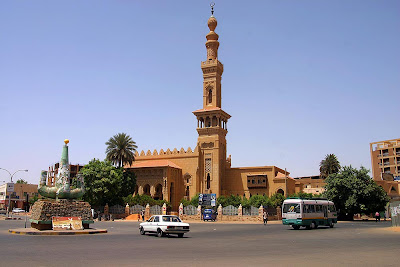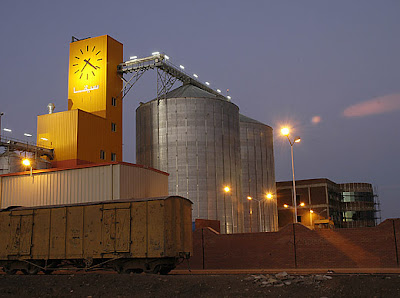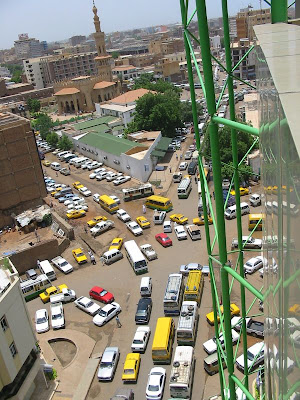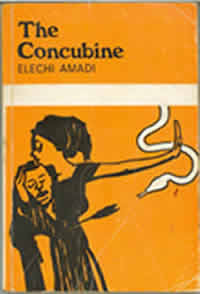 Fela Anikulapo Kuti, born in Abeokuta, Nigeria in 1938, was a singer-composer, trumpet, sax and keyboard player, band leader, and politician.
Fela Anikulapo Kuti, born in Abeokuta, Nigeria in 1938, was a singer-composer, trumpet, sax and keyboard player, band leader, and politician.
Fela was born to a wealthy Yoruba family as Olufela, Olusegun, Oludotun Ransome-Kuti. Fela recalls his father as having been very strict, to the point he thought his father as wicked man. Fela's father lived by the the biblical principle 'Spare the rod and spoil the child.' Nevertheless, Fela valued the lessons he learnt from his parents during his upbringing, as this experience contributed in shaping the man he grew up to be.
By the age of eight, he began playing the piano and organ. He became his school's pianist, playing at morning assemblies. As a young teen, he played in a band called Cool Cats. His rebellious side was also beginning to emerge; at age sixteen he formed a club called 'The Planless Society', with just seven members. Its sole aim was to violate all school rules. Fela also edited the journal of the club; 'The Planless Times Publication'. This was swiftly banned by the school authorities.
His political side was nurtured by his activist mother, Funmilayo Ransome-Kuti. She was a key figure in the nationalist struggle, and took Fela to political rallies. When Fela was 18, she introduced him to Kwame Nkrumah, a meeting Fela recalls as having 'changed his life'.

In 1958, at the age of nineteen, Fela went to Britain for further studies. He studied Classical Music at the Trinity College of Music, concentrating on wood wind instruments. He also formed a jazz band with his best friend, Jimo Kombi Braimah (J.K), called Koola Lobitos.
By 1961, he had met and married his first wife Remi Taylor and by 1963, he was back in Nigeria
A brief stint in the USA in the '60s nurtured Fela's radicalism, and he went home in 1970 determined to speak out for West Africa's oppressed urban poor. Fela led his sprawling, 30-plus-piece afrobeat band - first called Africa 70, and later Egypt 80 - through scathing broadsides against his government, international business and corrupt leaders all over. Early songs like "Zombie," a swipe at Nigerian Army soldiers, and "International Thief Thief" horrified authorities and earned Fela harsh retribution. He worked a short stint at the the Nigerian Broadcasting Corporation, as a radio producer, leaving the position to concentrate on his re-formed band, Koola Lobitos.
 In 1975, Fela changed his 'slave' name from Ransome to Anikulapo meaning 'one who has death in his pocket'.
In 1975, Fela changed his 'slave' name from Ransome to Anikulapo meaning 'one who has death in his pocket'.
It is reported that of the numerous altercations Fela has had with the Nigerian government, 18th February, 1977 will forever remain a milestone in his life. His family house, called Kalakuta Republic, was besieged by Nigerian soldiers, and was set on fire. The damage which ensued cannot be quantified; however, valuable possessions, like a tape of his forthcoming film 'Black President,' perished. Dozens sustained malleable injuries. His 78/84 year-old mother whom was thrown out of a window, died months later as a result. Fela himself ended up with a cracked skull, one of a number of injuries which affected his capabilities on the trumpet and saxophone. Nor was he to recover financially. Kuti served time in jail for his role of 'safe guarding his person and property'. This incident led to the now very famous songs 'Unknown Soldier' and 'Sorrow, Tears & Blood', released in 1977 and 1979 respectively.
Fela’s affection for polygamy, condom-free sex, his advocacy of marijuana use and his penchant for performing in only his underwear provided the Nigerian government with the opportunity to repeatedly harass him, with the hope of suppressing his vocal political protests. Fela was arrested numerous times, mostly on unfounded charges, and was imprisoned four times.
 To the Pan-African world, Fela was a towering figure who arguably combined elements of pure artistry, political perseverance, and a mystic, spiritual consciousness in a way that no other individual ever has.
To the Pan-African world, Fela was a towering figure who arguably combined elements of pure artistry, political perseverance, and a mystic, spiritual consciousness in a way that no other individual ever has.

Fela with his wives. According to Fela in African Culture women are taught not to be jealous.
"It is very important for a man to marry many women because a man goes for many women in the first place. Like in Europe,when a man is married he goes out when the wife is sleeping...he should bring the women to the house to live with him, and stop running around the streets. That is what a man is supposed to do...a man is not supposed to run around the streets after women...women should be in his home." -Fela Kuti
In 1978, in a total act of defiance against moral and social issues, Fela married 27 women in one traditional ceremony. This event was televised around the nation. In 1986, Fela divorced his wives, explaining that "I do not believe any more in the marriage institution. The marriage institution for the progress of the mind is evil. I learned that from prison. Why do people marry? Is it to be together? Is it to have children? People marry because they are jealous. People marry because they are possessive. People marry because they are selfish. All this comes to the very ugly fact that people want to own and control other people's bodies. I think the mind of human beings should develop to the point where that jealous feelings should be completely eradicated."
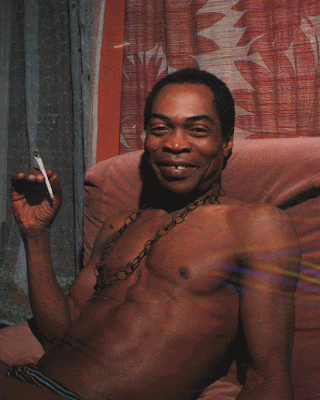
The year 1997 marked the beginning of the end for Fela. He played his last public paying show in March at the Muson Center. The shrine was raided in April, and, yet again, Fela was detained for possession of and trafficking in drugs. In mid-July, Fela collapsed at his home and was rushed to hospital. Towards the end of the month, speculation had reached fever pitch over his health. A national newspaper announced his death - this prompted Dr. Beko Ransome-Kuti to issue a press release, on the 24th July to quell such rumors; "He is responding to treatment", he announced.

One of his defining characteristics was his view on death. He told biographer Carlos Moore: "Death doesn't worry me man. When my mother died it was because she finished her time on earth. I know that when I die I'll see her again, so how can I fear death? . . . So what is this **** world about? . . . I believe there is a plan . . . I believe there is no accident in our lives. What I am experiencing today completely vindicates the African religions. . . I will do my part . . . then I'll just go, man. . . Just go!"
On the 2nd August 1997, at approximately 5:30pm, Olufela Anikulapo-Kuti died from heart failure arising from complications of HIV/AIDS. As Fela had said; "when you think you die, you're not dead. Its a transition." His son Femi now carries on the afrobeat tradition with his popular 17-piece group, Positive Force.
 "I don't object to what people hear. But my music is African music."
"I don't object to what people hear. But my music is African music."
WATCH VIDEOS
Fela Kuti Documentary and Music Click here
Part 2
Part 3
Part 4
Part 5
Part 6
TEXT & MORE INFORMATION
The Talking Drum
Fela Kuti Project










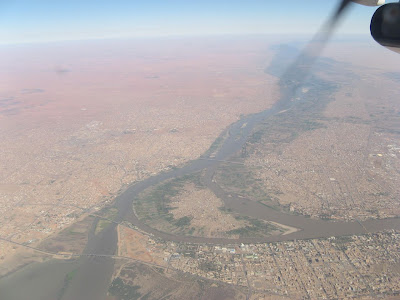


 The White Nile and the Blue Nile merge. The Al Mogran development will be situated on the peninsula to the bottom-left
The White Nile and the Blue Nile merge. The Al Mogran development will be situated on the peninsula to the bottom-left








